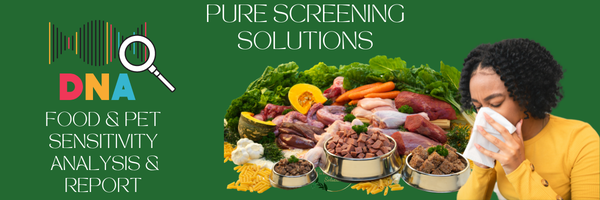
ARE YOU TIRED OF SNEEZING, SCRATCHING AND SNIFFING?
TIRED OF NOT EATING YOUR FAVORITE FOODS?
CAN'T PLAY WITH CATS OR DOGS?
Get reliable, actionable answers from your DNA!
Do you ever get an upset stomach, gas, diarrhea, or feel sleepy after eating? Do you suddenly have itchy eyes or difficult breathing and suspect you might be sensitive to your new kitten's dander? In your search for answers a Food & Pet Sensitivity DNA test is a great place to start.
What it is?
A science-based DNA test that reveals how your genes may make you more sensitive to common irritants in these eight key areas:
FOOD & PET SENSITIVITY
*Understand the Common Symptoms
*Histamine Sensitivities
Get Actionable, Reliable Answers from Your DNA.
We Make It Easy From Start To Finish!
Schedule your appointment at Pure Screening Solutions, Our Collector will swab DNA from your cheek quickly, easily and in private, mail the samples to our accredited lab, and in just 6 weeks you’ll receive a comprehensive genetic report—based on your unique DNA—that can empower you to make targeted changes, both in your personal environment and in how you eat, to live your life more comfortably.
You can also have a 1 on 1 consultation with our Nurse Practitioner to help you with diet changes if you choose.

About Food and Pet Sensitivity Testing
Results include your genetic predisposition for sensitivity to:
- Gluten—Gluten is a protein in wheat, barley, and rye. Humans do not have the enzymes to break down gluten, leaving tiny particles in the digestive tract that may cause sensitivities for certain individuals.
- Lactose—Lactose is a sugar found in animal-sourced milk and dairy products. Certain genetic markers may make it more likely to have difficulty digesting foods containing lactose.
- Cow Milk Protein—Milk is made up of water, fat, lactose, minerals, and protein. Sensitivity to milk protein is not the same as lactose sensitivity, but it is one of the most common ones for children.
- Egg—Egg sensitivities are very common, and many people are sensitive to the white part, called albumin, versus the yolk.
- Peanut—Peanut sensitivity is extremely common and is often passed down through generations.
- Other Foods—Many people are sensitive to other foods that are different from the ones included elsewhere in this test; they may include tree nuts, soy, corn, yeast, fish, and shellfish.
- Pet Dander—Pet dander consists of tiny particles of skin shed from animals that have hair, fur, or feathers. Certain genetic markers may make an individual more sensitive to contact with dander.
- Histamine—Histamine is a natural compound that may be found in foods that are aged and fermented, red wine, and more. Some people have an inability to break down excess histamine, which can cause sensitivities.
In addition to giving conclusions about your sensitivity to individual irritants, the report also provides comprehensive and detailed diet, lifestyle, and supplement tips based on your results, so you can start making proactive changes right away.
Relief is in sight—you really can lead a more comfortable life.
Due to state regulations, this test is currently not available in New York and Maryland. This product is not intended to diagnose, treat, cure, or prevent any disease. Please note this is not an allergy test: to diagnose allergies, consult your medical provider. The report is provided for educational and informational purposes only. Results contain information only from genes and do not include environmental factors that may cause or aggravate symptoms.



